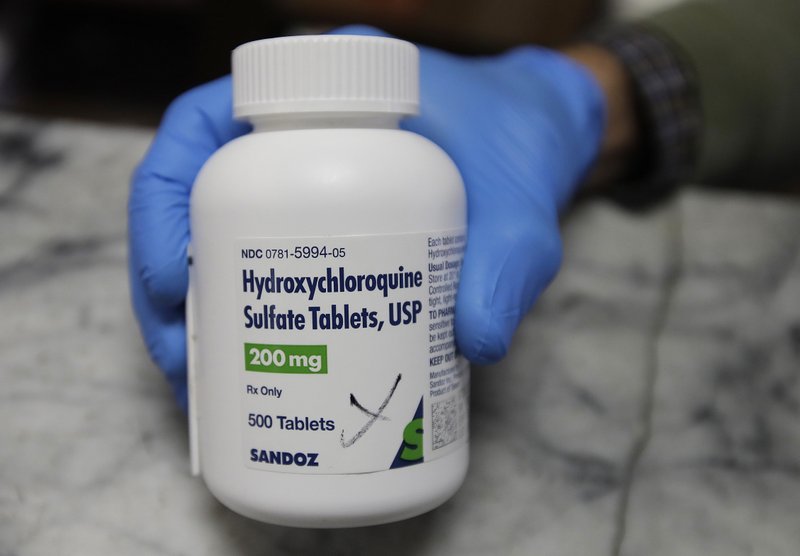WASHINGTON -- President Donald Trump and his administration kept up their promotion Monday of an anti-malaria drug not yet officially approved for fighting the new coronavirus, even though scientists say more testing is needed before it's proven safe and effective against covid-19.
Trump trade adviser Peter Navarro championed hydroxychloroquine in television interviews a day after the president publicly put his faith in the medication to lessen the toll of the coronavirus pandemic.
"What do I know? I'm not a doctor," Trump said Sunday. "But I have common sense." In promoting the drug's possibilities, the president has often stated, "What have you got to lose?"
The virus has killed almost 11,000 people in the U.S., and measures meant to contain its spread have taken a painful economic toll and all but frozen life in large swaths of the country.
But medical officials warn that it's dangerous to be hawking unproven remedies, and even Trump's own experts have cautioned against it.
The American Medical Association's president, Dr. Patrice Harris, said she personally would not prescribe the drug for a coronavirus patient, saying the risks of severe side effects were "great and too significant to downplay" without large studies showing the drug is safe and effective for such use.
[Video not showing up above? Click here to watch » https://www.youtube.com/watch?v=XsbYHn9c2YI]
Harris pointed to the drug's high risk of causing heart rhythm problems.
"People have their health to lose," she said. "Your heart could stop."
The top U.S. infectious disease expert, Dr. Anthony Fauci, has repeatedly said current studies provide only anecdotal findings that the drug works. In response, Navarro told CNN on Monday, "I would have two words for you: 'second opinion.'"
Hydroxychloroquine is officially approved for treating malaria, rheumatoid arthritis and lupus, not covid-19. Small, preliminary studies have suggested it might help prevent the new coronavirus from entering cells and possibly help patients clear the virus sooner. But those have shown mixed results.
Doctors are already prescribing the malaria drug to patients with covid-19, a practice known as off-label prescribing. Research studies are now beginning to test if the drugs truly help covid-19 patients, and the Food and Drug Administration has allowed the medication into the national stockpile as an option for doctors to consider for patients who cannot get into one of the studies.
However, nearly half the supply of hydroxychloroquine to the U.S. comes from makers in India, a flow that has now been abruptly stanched after that nation banned exports of all forms of the drug.
According to data compiled by Bloomberg Intelligence, 47% of the U.S. supply of the drug last year came from India makers, and only a handful of suppliers in the top 10 are non-Indian.
India's export ban on the drug is aimed at ensuring it has enough supply for domestic use after Trump's endorsement sparked global stockpiling. As the pandemic widens globally, countries competing for supplies have enacted export bans or restrictions on goods from rice in Vietnam to face masks in Germany.
While Trump said the U.S. has secured 29 million choloroquine or hydroxychloroquine pills for its medical stockpile and American drugmakers including Mylan NV have re-started production of the tablets to meet U.S. needs, the India ban is likely to push prices up in the short term, while limiting available supply in the long term.
Some limited studies have been conducted on the use of hydroxychloroquine and antibiotic azithromycin in concert to treat covid-19, but they have not included critical control groups that scientists use to validate the conclusions.
Fauci has repeatedly found himself tasked with trying to keep Trump's statements rooted in fact -- a role that often puts the scientist in the awkward position of having to publicly contradict the president.
And his job, Fauci told Science Magazine last month, isn't easy.
"I can't jump in front of the microphone and push him down," Fauci said, referring to Trump. "OK, he said it. Let's try and get it corrected for the next time."
Though Fauci stressed that Trump does listen to him "on substantive issues" related to coronavirus, that has not appeared to be the case when it comes to the efficacy of existing drugs as treatment.
But on Sunday, as the number of coronavirus cases in the country continued to soar and the U.S. surgeon general warned that Americans are about to experience "the hardest and saddest week" of their lives, Trump and Fauci were united on at least one front: "The most effective weapon in this war," as the president put it, is not catching the virus.
"The only tool, but the best tool, we have is mitigation," Fauci said. "If we really want to make sure that we don't have these kinds of rebounds that we're worried about, it's mitigation, mitigation, mitigation."
On this note, Trump nodded in agreement.
[CORONAVIRUS: Click here for our complete coverage » arkansasonline.com/coronavirus]
Information for this article was contributed by Zeke Miller, Deb Riechmann, Marilynn Marchione, Linda A. Johnson, Jonathan Lemire, Maria Cheng, Amanda Seitz, David Biller and Jill Colvin of The Associated Press; by Allyson Chiu and Meagan Flynn of The Washington Post; and by Lisa Du of Bloomberg News.
A Section on 04/07/2020
